
Publisher:
Bonnie King
CONTACT:
Newsroom@Salem-news.com
Advertising:
Adsales@Salem-news.com

~Truth~
~Justice~
~Peace~
TJP
Jan-10-2010 00:15

 TweetFollow @OregonNews
TweetFollow @OregonNews
The Fragging of American Officers: Historic Problems and Future Planning
Tim King Salem-News.comAn American Vietnam War officer describes the day a soldier tried to kill him with a hand grenade.
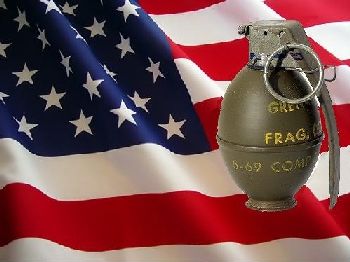 The term 'fragging' developed during the Vietnam War when increasing numbers of combat troops used fragmentation grenades to kill officers. |
(SALEM, Ore.) - The term 'fragging' has been referenced a number of times in our history at Salem-News.com, mostly in articles by our writer Dr. Phil Leveque, who served as a combat infantryman in WWII before beginning his life as a man of medicine and healing{1}.
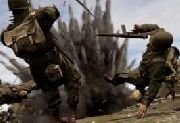
Fragging refers to the killing of officers, military leaders, while at war. One former officer who narrowly escaped the receiving end of a grenade fragging in the Vietnam War, tells me that his life is permanently altered by that explosion. It was intended for him, but instead killed two other soldiers, and still causes him great distress, in the form of Post Traumatic Stress Disorder[2].
I can't imagine how any person could avoid such a fate. But as I told him, sharing a story of this magnitude with the general public could well go on to actually save a life.
We will refer to this officer and gentleman as 'Randy', since he preferred that his real name not be used.
What we call fragging the British Navy called "Shot Rolling" after the practice of rolling a cannon ball across the deck for the purpose of injuring an officer. The methods may vary but the results are the same{3}.
A veteran chillingly explains in a logical, step-by-step fashion how and why |
The reasons behind such rash decisions may vary, ranging from cowardice, to revenge, to insanity and countless things in between. Dr. Phil Leveque points to PTSD as a primary reason in many cases, referring to the endless number of human beings who break down in war, sometimes with disastrous results.
In some cases, officers in war really are ill placed. There is the phenomenon of the "90-day wonder" which is the amount of time the military requires to transform a college graduate into a military figure who instantly outranks every enlisted person in the entire military, generally at the age of 22. Another derogatory term for second-lieutenants is "butter bars" for the gold bars representing their rank. In the U.S. Navy, the O-1 rank is referred to as an ensign.
Some, like the Vietnam Veteran in this video, will tell you that at times, fragging was selected to prevent an officer from leading combat forces to certain death. In Randy's particular case, there is no connection to perceived leadership issues.
In as much as human behavior has not changed for thousands of years it is easy to appreciate that this problem has existed in all facets of the military in all nations. Randy says what does and can change, is how it is recognized and dealt with.
The years after the Vietnam War were not that bad for Randy, he says. But things changed. "It was not until I lost my job that I went to the VA and was diagnosed with Chronic PTSD that I discovered the insidious long term affects of the fragging which I was the target. Even as I write this the physical impact on me is telling."
Randy describes himself as an agoraphobic[4].
"I trust no one. Have no friends. Don't use the phone. I have since found out that the PTSD I experienced became sublimated only to surface 20 years later as a chronic condition. When I try to explain this to my mental health provider I draw a blank. He doesn't have a clue, and I can't get through."
Dr. Leveque has written on many occasions about the lack of proper diagnosis and care of veterans; he says it is more common than not, particularly when the VA relies on psychologists with four year degrees, rather than actual doctors, for diagnosis and treatment.
For Randy, the search for help continues to be a rough road at best, and he finds it exceedingly disappointing that the majority of information trivializes fragging, adding, "Who knows, maybe that's denial too."
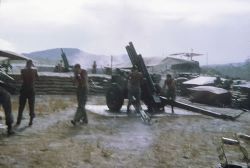 American firebase in the Vietnam Conflict |
I don't think so, not at all. I remember sitting on benches at a military base in Kuwait when I was making my way back from covering the war in Iraq during the summer of 2008, talking to soldiers about things they had witnessed since being deployed. They talked about soldiers actually brandishing their weapons and shooting each other. Actual gunbattles between Americans inside the base compounds. This information rarely if ever gets out[5].
Randy began researching fragging, and that work revealed that the increase in these incidents in 1970, coincided with the rotation out of the Regular Army troops and the influx of the Reserve draftees. Randy was also a draftee, he chose to attend Officers Candidate School instead of being drafted as a private, since he had already completed college.
In his opinion, it seems clear that the level of training and development significantly impacted the attitude and motivation of the service member.
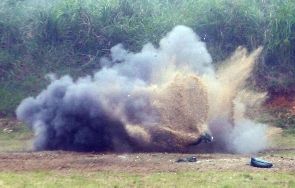 M-67 Fragmentation Grenade explosion in Vietnam |
In June, 1971, Colonel Robert Heinl declared that the Army in Vietnam was "dispirited where not near mutinous" in an article titled "The Collapse of the Armed Forces". It was the corroboration of the belief that military leaders themselves recognized a crisis among Vietnam soldiers in the war's last years{6}.
I have heard a lot of stories about how crazy Vietnam was in the later period, especially compared to the first few years. The consistent dynamic between Vietnam and the present wars, is that each saw the standards for enlistment drop well below the requirements of peacetime years. Combined with the draft, this produced many behavioral problems in the Vietnam War, including an increase in fragging as the years passed[7].
There is not a current draft in the U.S., but there is a Stop-Loss program that prevents soldiers from exiting the Army on their end of service date. Not a draft, but the results are similar on more than one level. The policy has great impact on multiple tour combat veterans who simply need to exit the military, but are forced to stay.
The problems stemming from the lowered enlistment requirements and forced tours of duty in Iraq and Afghanistan are not of the same magnitude as Vietnam, at least not yet, but still worth noting.
One Deadly Day in 1970
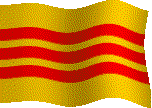 Flag of South Vietnam |
Randy says his darkest day took a wrong turn when a 19-year old clerk in his office received a "Dear John" from his wife.
Working with the Red Cross, Randy and his fellow officers immediately authorized the young man to go on emergency leave.
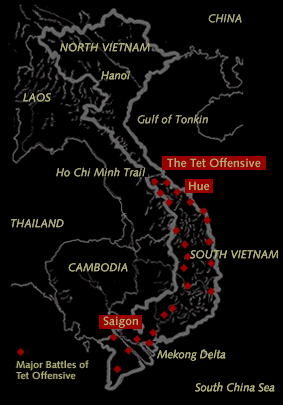 Vietnam in 1970 |
The day the clerk was leaving for home, Randy and his Supply Sergeant were preparing to inventory an ammo bunker that his unit shared with an Army Postal Unit.
"There was an explosion and when we looked out we saw smoke issuing from the sandbag revetment that surrounded the bunker."
Randy's first thought was that they were under rocket from "charlie" - North Vietnamese or Viet Cong forces. "Victor Charlie" as the VC were known by US troops, were guerrilla fighters who often struck American bases with mortars and rockets.
"When I went to secure the area, I checked out the revetment and saw the macerated remains of a soldier. What was left of him was still smoldering."
An Army Explosive Ordinance Disposal crew went to work clearing the area, and they discovered that there were not one, but two bodies in the area of the explosion. Two men died in the flash of an instant.
Randy says an investigation revealed that a fragmentation grenade had been placed pin out under a sandbag at the lintel of the Conex container holding their ammo. A Conex is a premanufactured building that can be used by the military in a variety of roles.
The sight that Randy and the others investigating the explosion confronted, was something he says he would not forget.
"It appears that the first person into the bunker after kicking it loose bent over to pick it up when it exploded. The top half of his body had disappeared. The 3600fps velocity of the frags in a confined space did a job."
As it turns out, the two dead soldiers were captains from the Postal Unit about to do an inventory for a change of command. They were not the intended target, Randy and the supply sergeant were.
Warning Signs
As a society we now have school children trained to look for signs of instability and potential deadly violence in their fellow students, but reaching that level of accountability in the military while at war is a much more difficult prospect.
Randy discovered that the night before the deadly blast, the same 19-year old clerk had shown a grenade off to his buddies. This is not something that these soldiers could easily get their hands on, they weren't combat soldiers.
His fellow soldiers didn't take it from him or report the fact that he had it, and it is unlikely that any ever would, that just isn't how things normally work. Still, if they had, the world might be a somewhat different place today. Those captains disappeared in an instant, their futures forever silenced by a tremendous thundering blast.
Without any real knowledge of who was responsible, life moved forward and the clerk in question soon boarded a plane for home, via Hawaii. At this same time however, the Army CID investigators determined that the clerk was the prime suspect. An agent flew to Hawaii and even managed to arrive in advance of the clerk's flight.
"After 3 days of interrogation and no confession they were about to let him go when the investigator pointed to the pictures of the victims and commented on how disappointed I was going to be when I found out he was released," Randy said.
"The clerk broke down and crying, admitted that he set the grenade."
The 19-year old was tried by court-martial and convicted of two counts of Manslaughter. The Army kept the profile on the case low.
"He was not tried for murder because a death penalty would be bad publicity."
Randy says the threat of fragging was so significant after this, that senior NCO'S and Officers were immediately removed from their commands at any indication of a fragging.
Randy believes that the clerk who set the grenade was not aware of what it was he was doing, nor of its severity. Only he could really answer that.
This is one of those dark subjects that nobody likes to confront. I have never been to Vietnam and can only work from veteran input and recorded historical data. I can tell you that most of the time in this day and age, officers are firmly in control and few are dying because of fragging incidents.
I witnessed an Army enlisted man berate a Lt. Colonel during a stressed out day on a mission in the middle of nowhere. In the Marine Corps, that would have lasted less than three seconds. No enlisted Marines address officers with disrespect and profanity, at minimum it would be a rare day.
So, perhaps the problem is as simple as that; more discipline leads to fewer fraggings. Better training for officers allows them to prepare for what they are doing in a more reasonable way.
The single thing a fragging accomplishes is death. If it is a fast death for the officer, it will be a long and agonizing one for the person who took their life as their conscience gnaws and eats away at their psyches.
There is military protocol, there are grievance procedures. There is no justifiable reason for fragging an officer, there is also no good excuse for a naive officer putting people in excessive harm when there are sergeants and corporals on hand to help a new officer learn the ropes. The responsibility is far reaching.
If you have a story about a fragging, Dr. Leveque and I would like to hear about it.
Source links:
=================================================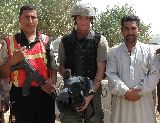 Tim King is a former U.S. Marine with twenty years of experience on the west coast as a television news producer, photojournalist, reporter and assignment editor. In addition to his role as a war correspondent, this Los Angeles native serves as Salem-News.com's Executive News Editor. Tim spent the winter of 2006/07 covering the war in Afghanistan, and he was in Iraq over the summer of 2008, reporting from the war while embedded with both the U.S. Army and the Marines. Tim holds numerous awards for reporting, photography, writing and editing, including the Oregon AP Award for Spot News Photographer of the Year (2004), first place Electronic Media Award in Spot News, Las Vegas, (1998), Oregon AP Cooperation Award (1991); and several others including the 2005 Red Cross Good Neighborhood Award for reporting. Serving the community in very real terms, Salem-News.com is the nation's only truly independent high traffic news Website. You can send Tim an email at this address: newsroom@salem-news.com
Tim King is a former U.S. Marine with twenty years of experience on the west coast as a television news producer, photojournalist, reporter and assignment editor. In addition to his role as a war correspondent, this Los Angeles native serves as Salem-News.com's Executive News Editor. Tim spent the winter of 2006/07 covering the war in Afghanistan, and he was in Iraq over the summer of 2008, reporting from the war while embedded with both the U.S. Army and the Marines. Tim holds numerous awards for reporting, photography, writing and editing, including the Oregon AP Award for Spot News Photographer of the Year (2004), first place Electronic Media Award in Spot News, Las Vegas, (1998), Oregon AP Cooperation Award (1991); and several others including the 2005 Red Cross Good Neighborhood Award for reporting. Serving the community in very real terms, Salem-News.com is the nation's only truly independent high traffic news Website. You can send Tim an email at this address: newsroom@salem-news.com
Articles for January 9, 2010 | Articles for January 10, 2010 | Articles for January 11, 2010
Quick Links
DINING
Willamette UniversityGoudy Commons Cafe
Dine on the Queen
Willamette Queen Sternwheeler
MUST SEE SALEM
Oregon Capitol ToursCapitol History Gateway
Willamette River Ride
Willamette Queen Sternwheeler
Historic Home Tours:
Deepwood Museum
The Bush House
Gaiety Hollow Garden
AUCTIONS - APPRAISALS
Auction Masters & AppraisalsCONSTRUCTION SERVICES
Roofing and ContractingSheridan, Ore.
ONLINE SHOPPING
Special Occasion DressesAdvertise with Salem-News
Contact:AdSales@Salem-News.com

googlec507860f6901db00.html



Terms of Service | Privacy Policy
All comments and messages are approved by people and self promotional links or unacceptable comments are denied.
Bob Teachout October 5, 2017 8:27 pm (Pacific time)
The 90 days was for an enlisted man becoming an instant Non-Commissioned Officer. Also referred to as "Shake and Bake"
Russ April 30, 2010 2:39 am (Pacific time)
Kurt Vonnegut discussed how "fraggers" were deciding US foreign policy. Although the Pentagon Papers were released in '68, it was something of a cover for the (non-Marxist) class warfare among the troops in 'Nam. The upper/middle class had to turn against the war or admit the foot soldiers were in control.
Ron January 29, 2010 8:15 pm (Pacific time)
I went AWOL from the nasty guards in 03 as we had many nutcases who talked of killing their own soldiers and such. No way will I go back.
C.V. Compton Shaw January 11, 2010 7:50 pm (Pacific time)
During the War in Vietnam, to become an Infantry Officer in the US Army, you had to go to OCS at Fort Benning for approximately 6 months not 90 days as the article implies. Also, during the War in Vietnam there were plenty of fraggings of enlisted personnel by other enlisted personnel. The most common reason for the same was the belief that the person fragged was dangerous to the unit because of incompetency, cruelty, and/or criminal behavior.
I saw one NCO send another new NCO (instant) and another new enlisted man out to the perimeter, which perimeter had mines, of a small fire base to pick up trash. The older experienced soldiers, including myself, refused to do the same because of the mines in the area.The instant NCO was immediately wounded and the enlisted man was killed by mines exploding. This was, in fact, an intentional act of murder by the NCO who had ordered the same. He had to leave the unit immediately as he knew that, if he didn't, he would be SHOT!
I, generally, had the highest regard for the officers and men who served in Vietnam.
Tim King: Thank you very much for your comment, I did not know that OCS lasted six months during the Vietnam War. Experiences like yours are valuable to share, much appreciated.
Josh A. January 11, 2010 9:48 am (Pacific time)
Sorry Randy... The world is full of kinder people than that. War is hell. Don't let someone else's sick behavior destroy your mind. I saw a video of a guy on top of a tank in Iraq toss the frag off and it landed in a tightly herded bunch of sheep. The herdsman threw up his crook and his hands as his livelihood blew up right in front of him. Now I ask one question: How many terrorists did this United States soldier just create, for his own country to fight, because of that frag? You realize that the sheep-herding man is going to tell 1000 people what he saw and probably trade his crook for an assault rifle. These kids with guns need to be trained in ethics. Nobody on Earth respects that kind of a lack of discipline in a soldier. Just because your a trained killer does not mean you don't have a purpose. You cant just kill anything you see! My mind pours over the suffering TO, and because of military veterans often...
Jess Mendoza January 11, 2010 12:38 am (Pacific time)
Very interesting read, you're right few people really think about this anymore, but it is no less important.
Frances January 10, 2010 4:12 pm (Pacific time)
I had a colonel in the army reserve I'd like to... He tried to rape me - in civilian life he was a high school principal.
Editor: Frances, I appreciate your story, but let's try to stay out of trouble shall we? I'm pretty sure you know we care a great deal about the subject of military rape. We will never turn our minds away from the importance of that.
[Return to Top]©2025 Salem-News.com. All opinions expressed in this article are those of the author and do not necessarily reflect those of Salem-News.com.